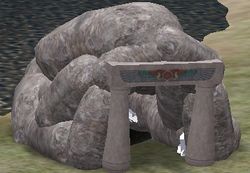Mine
| Mine | ||||||||||||||
|---|---|---|---|---|---|---|---|---|---|---|---|---|---|---|
 |
||||||||||||||
| (Building) | ||||||||||||||
| Location | ||||||||||||||
| Outside | ||||||||||||||
| Requirements | ||||||||||||||
|
||||||||||||||
Mines are constructed on ore veins to extract metal Ore, as well as various Gems and Coal. Ore veins are discovered using the Dowsing skill with a Dowsing Rod.
Mines in Tale 7 did not collapse, unlike previous tellings.
Mines must be 13 coords apart
Mines not built on an ore vein produce sand, though they still can produce gems and coal.
Public Mines
See the Public Mine Locations page.
Cost
Operation
You must have learned the Mining technology to operate a mine. When worked, a mine produces a number of stones on the ground in front of it with varied shapes, colours, bases and crystals. Each ore type has different rules for which properties vary and which are fixed.
The principle of mining is to find groups of these stones as "workloads" according to certain rules. Each workload of at least three stones yields ore, and stones from a single pull on the mine can be re-used in multiple workloads. Miners can use a given workload of exactly the same set of stones once each.
For each varying attribute (e.g. body colour and crystal shape for iron), the stones in the workload must be all the same, or all different. So as an example, three stones with red patterns on the body (all same colour) and three different shapes of crystals on top (all different) would qualify. Two red stones and one blue would not qualify regardless of crystal shapes.
For many ore types, including copper, larger workloads produce larger yield ranges for ore compared with smaller workloads of that ore type. You will also receive an increasing bonus on top of the base workload amount for each successful workload from the same mine pull. This bonus will reset if you attempt to finalize an invalid workload.
More information on mining, including the differences between each ore type, can be found at the Mining Guide
Produces
- Aluminum Ore
- Antimony Ore
- Cobalt Ore
- Copper Ore
- Gold Ore
- Iron Ore
- Lead Ore
- Lithium Ore
- Magnesium Ore
- Nickel Ore
- Platinum Ore
- Silver
- Strontium Ore
- Tin Ore
- Titanium Ore
- Zinc Ore
Gems
- Small Diamond, Medium Diamond, Large Diamond, Huge Diamond
- Small Emerald, Medium Emerald, Large Emerald, Huge Emerald
- Small Opal, Medium Opal, Large Opal, Huge Opal
- Small Quartz, Medium Quartz, Large Quartz, Huge Quartz
- Small Ruby, Medium Ruby, Large Ruby, Huge Ruby
- Small Sapphire, Medium Sapphire, Large Sapphire, Huge Sapphire
- Small Topaz, Medium Topaz, Large Topaz, Huge Topaz
See the Gems page or individual pages for a list of which regions produce which gems.
Using the same stone in different workloads for the 7th time will collapse it, producing a gem and coal in addition to the usual ore. The type of gem is fixed by the location of the mine, and research is ongoing to find the boundaries of regions of a given gem type.
I got a large gem by collapsing two stones in the same set, on different workloads. -Risa As Risa above, this is how I've gotten the one large stone so far. From collapsing a second stone in the same set. - Nurkii
There is a random element to the game also. sometimes it will give you the large for collapsing two in one set but not always it will not give you large just collapsing one at a time. - Cj-the-dj18
Public Mines
As mines don't break, many have been turned over to public use, so there are a lot of mines, particularly Sand, Copper and Iron that can be found all over Egypt. Locations of mines that either are conveniently located or have the rarer ores can be found at:
- Maps/Public Mines.
- Gems (more public sand mines listed)
| |||||||||||||||||